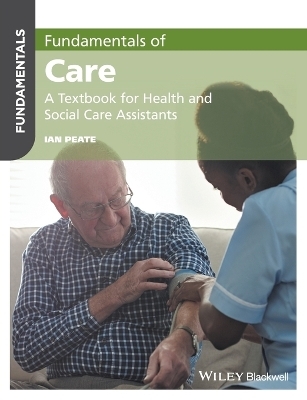
Fundamentals of Care
Wiley-Blackwell (Verlag)
978-1-119-21220-1 (ISBN)
Practically focused, each chapter begins with the outcomes associated with each standard, which helps contextualise and focus the reader on the content and relevance to the Care Certificate. The book also includes exercises to encourage the reader to stop, look, listen and act, thinking cap activity promotes further thinking and application to care and support provision along with case studies and resource files.
Written to help the reader come to terms with the role and function of the heath and care assistants, Fundamentals of Care offers support to those undertaking the Care Certificate and to assist those who already work as health and care assistants, helping them in their quest to enhance safe and effective care.
Ian Peate OBE is Editor-in-Chief of the British Journal of Nursing, and Head of the School of Health Studies, Gibraltar.
Preface xi
Acknowledgements xiv
How to use your textbook xvi
Chapter 1 Health and social care provision in the UK 1
Introduction 2
An historical view 3
The NHS in the four countries 3
Provision of services 7
Regulation and monitoring of services 7
Professional regulation 8
Primary care services 9
Secondary care services 10
Tertiary care services 10
Ambulance trusts 10
Mental health trusts 11
Community health services 11
Social care and support 11
Assessment of care needs 12
Assessment of health needs 13
Chapter summary 14
Chapter 2 Working with others, teamwork 16
Introduction 17
Teamworking 18
Teams and teamworking 20
Team dynamics 22
Barriers to effective teamworking 22
Conflict 23
Chapter summary 25
Chapter 3 Understanding your role 27
Introduction 28
Who are you? 29
Job description 29
Agreed ways of working 32
Policies and procedures 32
Codes of conduct 33
Responsibility 35
Accountability 36
Delegation 37
Relationships 38
Chapter summary 40
Chapter 4 Your personal development 42
Introduction 43
Lifelong learning 44
How learning takes place, learning styles 44
Strategies to help with learning 45
Personal development plans 46
Appraisal 46
Your personal development plan 47
The personal development portfolio 48
Supervision 49
Training and development 50
Core learning 50
Giving and receiving feedback 52
Chapter summary 53
Chapter 5 Duty of care 55
Introduction 56
Duty of care 57
Your duty of care 57
Concerns 58
Promoting independence 59
Providing information 60
The constitution, complaints, comments and compliments 61
Raising concerns 61
Untoward incidents 62
Negligence 63
Conflict 63
Responding to conflict 63
Chapter summary 64
Chapter 6 Equality and diversity 66
Introduction 67
Legislation 68
Equality duty 68
Human Rights Act 69
Defining terms 70
Labelling, stereotyping and prejudice 71
Inequality 72
People with learning disabilities and those with mental health problems 74
Cultural sensitivity 74
Chapter summary 76
Chapter 7 Working in a person‐centred way 78
Introduction 79
Working in a person‐centred way 80
Person‐centred values 82
Enabling 84
Coordinated care 84
Personalised care 85
Person‐centred planning 85
Supporting people 86
Advanced care planning 86
The environment of care 87
Minimising discomfort, distress or pain 88
Responding to a person’s discomfort 89
Self‐esteem 90
Personal identity 91
Promoting wellbeing, identity and self‐esteem 91
Chapter summary 91
Chapter 8 Communication 93
Introduction 94
Care, compassion and communication 95
Communication 95
Types of communication 96
Verbal communication 97
Non‐verbal communication 97
Working in teams 99
Communication and language needs 100
Communication aids 100
Barriers to effective communication 101
Strategies to reduce barriers to communication 102
Preserving confidentiality 103
Chapter summary 104
Chapter 9 Privacy and dignity 106
Introduction 107
Protecting information 108
Disclosure 109
Implementing respect, privacy and dignity 110
Informed choice and choosing options 114
Assessing risk 115
Equality and diversity 116
Promoting independence 118
Chapter summary 118
Chapter 10 Fluids and nutrition 120
Introduction 121
Food and drink safety 122
Protecting people 124
Personal protective equipment in food hygiene 125
Nutrition and hydration 127
The Eatwell plate 128
Hydration 130
Poor hydration and nutrition 131
Helping people with their nutrition and hydration 133
Chapter summary 136
Chapter 11 Awareness of mental health, dementia and learning disability 139
Introduction 141
Mental health conditions 141
Service provision 143
Depression 144
Anxiety 146
Bipolar disorder 147
Psychosis 147
Dementia 147
Learning disabilities 150
The social model of disability 152
Assessing and making a diagnosis 155
Mental capacity 155
Assessing capacity 157
Chapter summary 158
Chapter 12 Safeguarding adults 160
Introduction 161
Safeguarding 162
Types of harm and abuse 163
Safeguarding vulnerable adults: the principles 165
A person‐centred approach 166
Safeguarding Adults Boards 167
Identifying and managing risk 167
Suspected or disclosed abuse 168
Reporting concerns 169
Chapter summary 170
Chapter 13 Safeguarding children 172
Introduction 173
Safeguarding and welfare 174
Child abuse and maltreatment 175
Impact of parents or carers on a child’s health and wellbeing 176
Types of abuse 176
Physical abuse 177
Emotional abuse 177
Sexual abuse 177
Neglect 177
Radicalisation 178
Trafficking 178
Female genital mutilation (FGM) 178
Gang abuse 179
Children and social media 179
The rights of the child 181
What to do if you have concerns of suspected or alleged abuse 181
Escalating concerns 183
Chapter summary 183
Chapter 14 Basic life support 185
Introduction 186
The heart 187
The lungs 187
Basic life support 187
The AVPU scale for checking a response 191
Cardiopulmonary resuscitation (CPR) 191
Airway obstruction 194
Documentation 196
Automatic external defibrillators 196
Chapter summary 197
Chapter 15 Health and safety 199
Introduction 201
The law 201
Health and safety policies 201
Hazards in the workplace 202
Workplace hazards 203
Working with hazardous substances 206
Reporting health and safety hazards 206
Risk assessment 207
Accidents and incidents 207
Medicines 208
Moving, handling and assisting 209
Fire safety awareness 209
Working safely 212
Managing stress 212
Chapter summary 215
Chapter 16 Handling information 217
Introduction 218
Key legislation 219
The electronic patient record 221
Making concerns known 223
The use of social media 224
Chapter summary 224
Chapter 17 Infection prevention and control 226
Introduction 227
Roles and responsibilities 228
Transmission of infection 229
The chain of infection 231
Breaking the chain 234
Safe disposal of waste 235
Sharps disposal 236
Safe management of laundry 237
Personal protective equipment (PPE) 238
Chapter summary 238
Chapter 18 Questions you always wanted to ask 241
Introduction 242
Chapter summary 249
Annotated bibliography 251
Index 257
| Erscheinungsdatum | 04.03.2017 |
|---|---|
| Reihe/Serie | Fundamentals |
| Verlagsort | Hoboken |
| Sprache | englisch |
| Maße | 183 x 239 mm |
| Gewicht | 567 g |
| Themenwelt | Sachbuch/Ratgeber ► Gesundheit / Leben / Psychologie |
| Medizin / Pharmazie ► Pflege | |
| ISBN-10 | 1-119-21220-0 / 1119212200 |
| ISBN-13 | 978-1-119-21220-1 / 9781119212201 |
| Zustand | Neuware |
| Haben Sie eine Frage zum Produkt? |
aus dem Bereich


